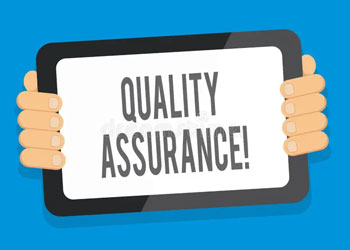Ellon Quality
Every process, every detail, we strive for excellence.

ELLON (ELLON) component quality control
The importance of quality management system
ELLON ELLON understands the importance of quality management system (QMS) in the manufacture of electronic components, and carries out strict identification, isolation, review and disposal of nonconforming products to ensure that nonconforming products do not flow into the next process or market, and prevent the misuse of nonconforming products. For example, in the production process, once non-conforming products are found, the system will immediately start corrective and preventive measures, notify relevant personnel through email, SMS, etc., and quickly respond and solve the problem.
Quality monitoring and early warning
The implementation of real-time quality monitoring in the production process, through the system for continuous monitoring of production data, abnormal or quality problems, immediately through mail, message, SMS and other ways to issue early warning notice, real-time monitoring to enable early detection of quality problems, early resolution, greatly reducing the risk of problem products flowing to the market.
Quality improvement management
ELLON ELLON improves the standardization of forms and processes, integrates with the OA system to realize task notification and reminder functions, tracks the management improvement process, and calculates the on-time completion rate to ensure that each quality improvement measure is effectively implemented. This closed-loop management method ensures that the effect of each quality improvement can be implemented, and the overall quality management level is constantly improved.
Product quality traceability
Through bar codes, RFID technology and big data analytics, companies can track the production, inspection and transportation of each product in real time. In case of quality problems, the system can quickly locate the problem batch and material source, providing strong support for problem solving and product recall. This traceability capability not only improves internal productivity, but also greatly enhances customer trust.
Design quality management
Through the establishment of R & D quality management process, the APQP (advanced product quality planning) is comprehensively controlled at all stages, covering supplier management, inspection data collection in the process of product research and development. This approach to early intervention ensures robustness and consistency of the design, reducing uncertainty in later production.
Statistical Process Control (SPC)
By supporting integration with incoming inspection, manufacturing process inspection reports and various hardware, the system can automatically collect data online or offline, and the analysis of these data can help identify variations and trends in the production process, providing a scientific basis for quality improvement. This real-time data analysis and control makes the production process more stable and the product quality more guaranteed.
After-sales quality management
Through the collaborative management of customers, repair service stations, factories and suppliers, the system improves the traceability and claim rate of after-sales claim identification. The collection and analysis of after-sales data helps to identify deficiencies in product design and production process, and provides data support for continuous improvement. This closed-loop after-sales management method not only improves customer satisfaction, but also promotes the continuous improvement of product quality.
Quality cost control
Through the quality cost management module, the data collection, statistical analysis and monitoring of enterprise quality costs are realized. This module helps enterprises to better control quality-related costs, reduce internal and external losses, and improve the overall economic benefits. Through quantitative input support, enterprises can make more scientific decisions on quality improvement and further optimize the cost structure.
Element derating
According to different applications, the stress applied to the components is derated to different degrees to ensure that the components work stably during their service life. For example, for critical military or aerospace applications, a higher degree of derating may be employed to ensure greater reliability. This approach increases the difficulty of design and production, but also brings higher product reliability and lower failure rates.
Service reliability
We emphasize the reliability of electronic components. From the selection and procurement of components to the use of design, electrostatic protection and screening, every link is strictly implemented in accordance with quality control standards. Only by ensuring that components can work properly under predetermined conditions throughout the life cycle can we truly improve the overall reliability of the product. For example, applications in high temperature environments place higher requirements on the heat resistance and stability of components, ensuring that they still perform well under extreme conditions.
Digital and intelligent production
The introduction of advanced digital and intelligent production mode, through low-cost automation equipment and artificial intelligence technology, accelerate the innovation of the production site, to achieve man-machine collaboration. Real-time data collection and analysis throughout the entire production process to ensure the double improvement of production efficiency and product quality. For example, through smart sensors and machine vision systems, real-time monitoring and self-adjustment of each link in the production line can be achieved, thereby significantly reducing human error and improving overall production efficiency.





